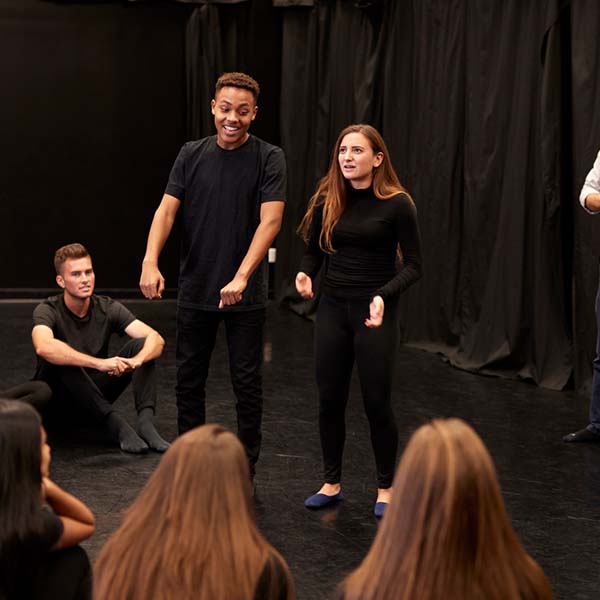Author Note
Correspondence regarding this article should be addressed to Martha McCoy, Executive Director, Everyday Democracy, 75 Charter Oak Avenue, Suite 2-300, Hartford, CT 06106. Phone: (860) 727-5910. E-mail: mmccoy@everyday-democracy.org
Abstract
Polarizing rhetoric, racist violence, and racial inequality continue to cast a dark shadow over U.S. democracy, threatening to further divide the nation’s communities. Practitioners, scholars, and everyday people alike are giving deep consideration to how the country can move forward during this time. This article describes the dialogue-to-change approach that Everyday Democracy has developed to expand opportunities for people to grapple with racism together, across racial backgrounds, and then work with each other and public officials to create positive, equitable change at the local, state, and national levels. The article examines the research and analysis of the dialogue-to change efforts supported by the Center for Public Life at Oklahoma State University, highlighting the ways they build on and advance lessons about creating and sustaining democratic discourse on racism. While campuses-as-communities are not democracies in and of themselves, they play an essential role in U.S. democracy.
Creating Democratic Spaces for Addressing Racism on College Campuses: The Example of Dialogue to Change at Oklahoma State University
The United States is struggling to address multiple interconnected crises. The global COVID-19 pandemic, which has taken more than 450,000 American lives to date, has laid bare glaring racial and ethnic disparities. In the early weeks of the pandemic, people around the globe witnessed the murder of George Floyd under the knee of a Minneapolis police officer—one of many terrifying incidents of violence against Black and brown people. This led to widespread multiracial and intergenerational calls for a racial reckoning that exceeded the scale and diversity of any protest in U.S. history. In the midst of all this, the racist and polarizing rhetoric surrounding the 2020 presidential election culminated in an assault on the U.S. Capitol that resulted in tragic loss of life and a new awareness of the impact of disinformation and white supremacist ideology.
How can the United States move forward in light of such division, racist violence, racial inequality, and threats to democracy? This question consumes us at Everyday Democracy, and we are certain it consumes the practitioners and scholars who read this journal. We believe that one of the most important answers to this question lies in expanding opportunities for people to grapple with racism together, across racial backgrounds, and then work with each other and public officials to create positive, equitable change at the local, state, and national levels.
Everyday Democracy is a national civic organization based in Hartford, Connecticut, dedicated to strengthening participation and problem solving through an explicit lens of racial equity.[1] The organization was founded 31 years ago to help create democratic spaces where people can have dialogue with each other across difference to uncover and implement solutions to public problems. From the early days of working with community leaders in every region of the United States, we began to see—and, over time, to understand deeply—that racism is a fundamental barrier to progress on all public issues. Without opportunities to understand and dismantle the racism embedded in institutions and systems, it is impossible for grassroots and institutional leaders to envision and create a more inclusive and just public life. This recognition led Everyday Democracy to adopt our dialogue-to-change approach and to apply a racial equity lens to all of our work.[2]
Working in this way over the past decades has also led us to reflect on and change our internal and external practices. Everyday Democracy’s staff and board are committed to learning about racism across the history of U.S. democracy and, even more importantly, to creating organizational practices and a culture that reflect values of racial equity and its intersection with other aspects of inclusion and equity (e.g., generational, gender, income, sexual orientation, and immigration status). Our longstanding and continuing internal learning lays a strong foundation for our external work with individuals and organizations across the country.
In our external partnerships with community coalitions and regional anchor institutions throughout the United States, we bring an intentional racial equity lens to our partnerships and shared learning.[3] As the hub of a national network, Everyday Democracy creates and refines public processes and tools, while striving to model racial equity in the training and coaching we provide. This approach strengthens our ability to support community coalitions and organizations that are creating democratic spaces for addressing racism through dialogue and action.
Our ability to coach depends on learning from and with our partners. As with other areas of our work, we bring an intentional racial equity lens to our evaluation and research. We invest in ongoing evaluation and research in an effort to understand the conditions under which different kinds of organizing, dialogue, and collective action can lead to measurable, equitable change around public issues. Whenever possible, we partner with external evaluators and researchers to enhance collective learning. We listen to participants, facilitators, and organizers as they describe the kinds of changes that emerge from their dialogue-to-change efforts, the changes that are most meaningful to them, and the barriers to change that they encounter. We have worked with many partners to document the impact of people meeting in racially diverse groups to hear each other’s experiences and views; to grapple with the meaning, history, and impact of structural racism; and to work together to create meaningful changes—in their individual and family lives, in their schools and workplaces, and in public decisions and practices.
The Center for Public Life at Oklahoma State University (OSU) became one of our anchor partners in 2019. The center has been creating democratic spaces for dialogue to change on the university’s campuses and in surrounding communities since 2017. We applaud the three years of dialogue to change organized by Cowboys Coming Together and its ongoing work (since fall 2020) as OSU’s Dialogues4Change. Further, their commitment to cross-disciplinary research carried out by an intergenerational, interdisciplinary research team is an exemplary model of applying scholarship to civic practice. This article documents that the research and analysis of OSU’s dialogue-to-change efforts on the Stillwater campus contribute significantly to knowledge about deliberative dialogue for the purpose of meaningful change around issues of racism.
Implications of Cowboys Coming Together Research for Dialogue-to-Change Practice, Evaluation, and Research
The efforts of OSU researchers and organizers on the Stillwater campus are noteworthy for the ways in which they build on and advance lessons about creating and sustaining democratic discourse on racism.
The Desire to Be Part of Meaningful Community Change Is One of the Most Powerful Incentives for Participating in Civic Dialogue
Evaluations of efforts to advance meaningful deliberative dialogue on racism over the past two decades have demonstrated the importance of this incentive, especially for those who are not typically included in civic processes in meaningful ways. Explicitly connecting dialogue to processes for collective action and change makes the invitation to participate more compelling for a larger and more diverse cross-section of the community. In particular, people of color—who are disproportionately affected by racism—are even more likely than others to express the need to see a clear pathway from dialogue to change before they commit their time and energies. This is also true of White people who have gained an understanding of the impact of racism.
The OSU research (Moore et al., 2021) affirmed this in the context of the Stillwater campus, where students were frustrated with the administration’s responses to incidents of hate speech. Students from many backgrounds who understood the impact of the incidents and of the administration’s response on people of color, specifically, and on campus climate were the first to understand the need for change. They began (and are continuing) their project with a passion to create an inclusive, equitable campus climate that addresses racism in democratic ways. Growing numbers of campuses are facing similar challenges; in response, they too are looking for ways to increase the understanding of racism across their campus communities and to support policies and practices that will lead to meaningful changes. As Dialogues4Change continues to expand and sustain its efforts, the explicit link from dialogue to change will continue to be essential to the program’s effectiveness.
The Simple Act of Being Asked to Participate—Especially by Someone You Know and Trust—Is a Powerful Incentive to Participate
Recruiting people who do not already see the importance of an issue is difficult, but it is achievable. Moreover, bringing new, diverse voices into the work expands the range of the kinds of changes that are likely to come from the process. As in Cowboys Coming Together, it is common for the earliest participants in a dialogue-to-change process to feel the greatest urgency to address the issue. Moore et al. (2021) affirmed this but also showed, through network analysis, that there was greater diversity in Cowboys Coming Together than is typical of similar campus efforts. Their research also offers clues about what will be required to reach the next level of inclusion and diversity in recruitment. For example, the program leaders are learning the value of multi-racial recruiting teams and the importance of person-to-person invitations. In the next rounds of dialogue to change, Dialogues4Change will seek creative ways to bring into the process new participants who might not immediately gravitate toward participation. Involving them will greatly increase the impact of the dialogue-to-change process on campus climate and will advance new participants’ motivations and skills, encouraging them to participate in other forms of civic action.
Changes in Individuals and Relationships Are the Earliest Impacts of Dialogue to Change on Racism
The immediate and short-term impacts of participating in diverse dialogue on racism are increased learning and understanding about the issue itself, combined with the formation of interracial relationships characterized by honesty, trust, respect, and commitment to justice. As they studied individual-level change, Moore et al. (2021) noted that 93% of respondents in Cowboys Coming Together reported that participation had increased their understanding of others’ attitudes and beliefs, while 90% reported that their participation had increased their ability to communicate more effectively with people who have beliefs different from their own.
Creating intentional, structured opportunities for these kinds of changes is critical since the majority of college students, faculty, staff, and administrators have had few opportunities to engage in any form of diverse conversation or learning about racism, either on or off campus. This is true, of course, across society as a whole, but college campuses are frequent flashpoints for broader polarization around issues of race and provide unique opportunities for diverse conversations in the midst of complex, painful, and conflictual challenges on college campuses.
Individual-Level Change Is Foundational, but It Is Not Sufficient for Achieving Either the Scale or the Kinds of Changes People Want to Be Part of
As important as individual-level change is, racism cannot be solved individually. Structural racism is a “wicked problem”—that is, it is multidimensional and multi-layered—and thus not amenable to one-dimensional fixes. Finding ways to link individual and relational changes to systemic change for racial justice is a complex, difficult, and essential challenge. Moore et al. (2021) documented some of the challenges of moving from individual and small group-level change to larger changes in policies, practices, and culture.
Evaluations of dialogue-to-change efforts in communities over the past 25 years have uncovered patterns in these challenges and have offered lessons for making and strengthening the link between participation and systemic change (Roberts & Kay, 2000; Vaughn, 2018). In the context of cities, towns, and counties, Everyday Democracy has found that meeting this challenge requires institutional buy-in (especially from the public sector), cross-sector and grassroots organizing, and a willingness to analyze and share power. It requires a commitment from institutional leaders to transparency and accountability, and to making extra efforts to listen deeply to those most affected by racism.[4] Finding ways to link the dialogue to collective action and institutional change represents the next level of work for OSU’s dialogue-to-change efforts. Many promising linkages are already underway, as documented in Moore et al.’s (2021) article in this journal issue.
Moore et al.’s (2021) description of the chain of connection–awareness–action expresses this linkage well. Lately, we at Everyday Democracy have added an element to this chain: connection–awareness–will–action. As awareness and connection grow, so does the urgency to take action to combat racism. Connection with others creates the empathy and sense of solidarity that are the bases of deeper awareness and the will to create change for the common good. (The passion for change and the will to create it are at the root of people’s persistence in their efforts for justice, even in the face of grave danger, as the late Congressman John Lewis often reminded us.)
From the earliest stages of organizing, one of the best ways to sustain this chain is to help individuals experience and understand their own voice and participation as part of the larger movement toward change. For example, with each new round of dialogue to change, new people are brought into the process, lending their voices and participation to the dialogue and to ongoing change efforts. Over time, as people outside the process see a meaningful impact on community climate, organizers are able to make an even stronger case to those who may have hesitated to participate in the early stages. We have found that clear communication of impact and helping people tell their own stories of change in their own voices are keys to sustaining action and contributing to measurable change. As the dialogue-to-change process unfolds on OSU’s Stillwater campus, and the organizers and researchers continue their efforts to advance practice and learning, they will support ongoing learning, transparency, and progress—not only on the Stillwater and other OSU campuses, but for the benefit of other campus communities embarking on similar efforts.
Conclusion
It is important to remember the kind of incidents that catalyzed the creation of Cowboys Coming Together, since episodes of hate speech are becoming more prevalent on college campuses. At a time of deep polarization, increased white supremacist activity, and growing calls for racial justice, campuses frequently find themselves at the center of controversies over free speech, disinformation, hate speech, and “cancel culture.” While campuses-as-communities are not democracies in and of themselves, they play an essential role in democracy. Land-grant universities such as OSU are finding ways to carry out their public mission by implementing and modeling the kind of democratic spaces the country urgently needs. That they have continued this amid a global pandemic is an additional inspiring act of civic leadership. During truly unprecedented times, members of the campus community are practicing the kind of democratic discourse on racism that can lead to meaningful change.
We at Everyday Democracy look forward to continuing to learn from and with our anchor partner at Oklahoma State University and with other college campuses that are committed to learning from and doing this essential work of strengthening equitable, participatory democracy.
References
Fung, A. (2005). Deliberation before the revolution: Toward an ethics of deliberative democracy in an unjust world. Political Theory, 33(3), 397–419. https://doi.org/10.1177%2F0090591704271990
Fung, A. (2015). Putting the public back into governance: The challenges of citizen participation and its future. Public Administration Review, 75(4), 513–522. https://doi.org/10.1111/puar.12361
McCoy, M. L. (2020). Building civic bridges through a lens of racial justice. In Democracy and civic life: What is the long game for philanthropy? (pp. 105–115). Knight and Kettering Foundations.
McCoy, M. L., & Heierbacher, S. (2019). Building capacity in communities: Everyday Democracy’s dialogue to change approach. In N. V. Longo & T. J. Shaffer (Eds.), Creating space for democracy: A primer on dialogue and deliberation in higher education (pp. 97–109). Stylus.
Moore, T. L., Stout, M. D., Grayshaw, P. D., Brown, A., Hall, N., Clark, C. D., & Marpaung, J. (2021). Cowboys Coming Together: Campus-based dialogues on race and racial equity. eJournal of Public Affairs, 10(1), Online.
Roberts & Kay, Inc. (2000). Toward competent communities: Best practices for producing community-wide study circles. Topsfield Foundation.
Sen, R., & Villarosa, L. (2019). Grantmaking with a racial justice lens: A practical guide. Philanthropic Initiative for Racial Equity.
Vaughn, D. (2018). Communities creating racial equity: Ripple effects of dialogues to change. The Paul J. Aicher Foundation/Everyday Democracy.
-
According to the Mary Reynolds Babcock Foundation, an equity approach “means developing targeted solutions that account for structural and historical disparities in opportunity, undue burdens and bigotry. Creating the conditions that allow everyone to prosper requires us to examine the root causes of injustices, including sexism, classism, homophobia, Islamophobia, antisemitism, ableism and all other forms of bias that threaten lives, freedom and dignity. It also demands we name racism explicitly” (https://www.mrbf.org/blog/becoming-explicit-about-equity). For a thorough explanation of the differences between a racial equity lens and a racial justice lens, see Sen and Villarosa (2019). ↑
-
For more on Everyday Democracy’s dialogue-to-change approach, see https://www.everyday-democracy.org/sites/default/files/sites/default/files/ED-DialogueToChange-onlinef.pdf. For more on the centrality of racial equity to Everyday Democracy’s work, see McCoy (2020). ↑
-
The Center for Public Life at Oklahoma State University is one of Everyday Democracy’s anchor partners. These partners serve as regional hubs for coaching and training on dialogue-to-change processes through a lens of racial equity and are committed to exchanging lessons and practices with Everyday Democracy and other anchor partners. For a more detailed explanation of Everyday Democracy’s anchor partnership efforts, especially with land-grant institutions, see McCoy and Heierbacher (2019). ↑
-
Regarding the relationship among deliberation, power, and accountability, see Fung (2005). For an example of community-based dialogue to change through a lens of racial equity that incorporates shared governance and public accountability, see Fung (2015). ↑
Author
 Martha McCoy, executive director of Everyday Democracy, has made important contributions to the fields of deliberative democracy, community problem solving, and racial justice. McCoy began at Everyday Democracy in 1991, becoming its director in 1995. Under McCoy’s leadership, Everyday Democracy has become respected as a national organization that excels in helping local communities build their own capacity to organize large-scale, diverse dialogue for problem solving. Under her direction, Everyday Democracy is at the leading edge of connecting public dialogue to collective action and democratic governance, and of keeping race and inclusion at the forefront of practices to strengthen democracy.
Martha McCoy, executive director of Everyday Democracy, has made important contributions to the fields of deliberative democracy, community problem solving, and racial justice. McCoy began at Everyday Democracy in 1991, becoming its director in 1995. Under McCoy’s leadership, Everyday Democracy has become respected as a national organization that excels in helping local communities build their own capacity to organize large-scale, diverse dialogue for problem solving. Under her direction, Everyday Democracy is at the leading edge of connecting public dialogue to collective action and democratic governance, and of keeping race and inclusion at the forefront of practices to strengthen democracy.
McCoy’s academic background is in political science, with her master’s degree and doctoral work (A.B.D., University of Connecticut) in the fields of political theory and methods, international relations, and comparative politics.



